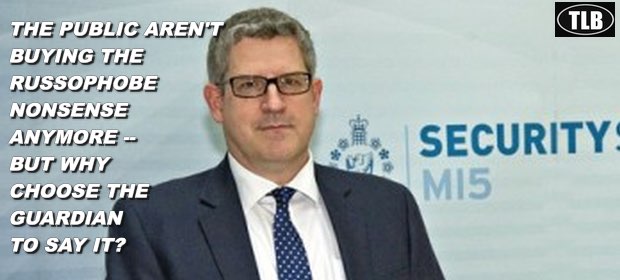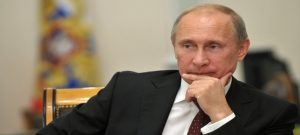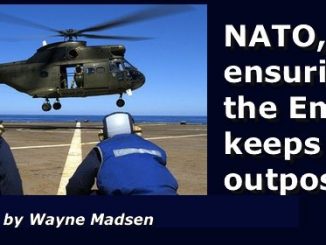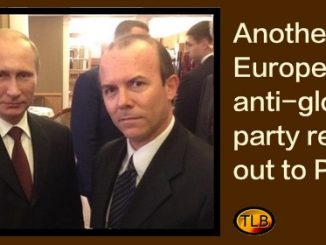
British spooks tack left to push anti-Russia agenda
FINIAN CUNNINGHAM
This week, with appropriate Halloween timing, the British news media were howling a Russian scare-story. Britain’s chief spymaster warned – through obliging media outlets – that Russia is posing an increasing threat to state security.

But the latest episode of Russia scaremongering had a couple of notable aspects. First, Britain’s normally secretive spy chief made a rare public appearance to deliver the frightening “news” in person. And, secondly, the chosen media conduit suggests that a certain political constituency among the British public is highly prized by the spooks in order to leverage their Russophobia.
In an unprecedented break with custom for the British secret service known as MI5, its director-general Andrew Parker was reportedly the first-ever incumbent head of the organization to give a full-court media interview. Oxbridge-educated Parker, 54, is the 17th head of MI5 since the agency’s formation. He has been in the job for the past nine years.
No British spymaster has ever given a public media interview until this week. Not even during the height of the Cold War.
Military Intelligence (Section) 5 was first established over a century ago in 1909, along with counterpart MI6. The former deals with internal state security, while the latter – associated with the exploits of fictional spy James Bond – is concerned with foreign espionage and counterinsurgency.
 It is therefore significant that MI5 boss Andrew Parker (right) came out of the shadows this week to hold forth publicly on allegations of Russia presenting a clear and present danger to British state security. Normally, the spooks confine themselves to behind-closed-door intelligence briefings to the British prime minister and ministerial Cabinet members.
It is therefore significant that MI5 boss Andrew Parker (right) came out of the shadows this week to hold forth publicly on allegations of Russia presenting a clear and present danger to British state security. Normally, the spooks confine themselves to behind-closed-door intelligence briefings to the British prime minister and ministerial Cabinet members.
The high-profile public intervention by the MI5 chief warning of “Russian threat” is indicative of a need to amplify official Russophobia.
Over the past two years, at least, the Cold War has been revisited by Western governments and mass media. Some trace this to the Ukraine crisis in 2014.
Since then, the Western public have been pummeled with a relentless media campaign which is obviously aimed at discrediting and demonizing Russia. Russia is accused of annexing Crimea and acting aggressively towards eastern Europe.
Never mind that Russia has repeatedly stated it neither presents a threat to any country, nor is there any convincing evidence to support Western claims of “Russian aggression”.
The fact-free nature of official Western charges against Russia suggests that such thinking is heavily ideological. It is imbued with Cold War concept, anti-Russian prejudice and a belligerent mindset necessary to project hegemonic power.
To a degree the rehabilitation of Cold War hostility towards Russia, and to a lesser extent China, has worked. Economic sanctions have been imposed on Russia by the US and the European Union – even though the EU economy, businesses, farmers and workers cannot afford such deteriorating commercial conditions.
The Russian scaremongering has also given a political cover for a dramatic expansion of US-led NATO military forces across eastern Europe, Scandinavia and the Baltic region. Just last month, NATO civilian chief Jens Stoltenberg pressed the 28 member states to “contribute to its biggest military build-up on Russia’s borders since the Cold War, as the alliance prepares for a protracted quarrel with Moscow.”
However, there is a distinct sense that the official narrative of Russophobia is atrophying. Like the proverbial boy who cried wolf too many times, there is more than a hint of jaded response from the Western public towards official claims of Russian presenting a security threat. Where’s the evidence, they ask? There is none. Thus the official scare-story begins to sound hollow.
It is remarkable, for instance, that electoral support for US presidential candidate Donald Trump has not been dampened despite lurid claims by his Democrat rival Hillary Clinton and numerous media pundits that the Republican candidate is a “pro-Russian stooge”. This kind of Cold War-era demagoguery simply doesn’t wash with the public in the same way it would have during the 1950s and 60s. And that is largely because Russophobia as a propaganda device has lost much of its power owing to the fact that claims of a Russian threat are so obviously unfounded.
This is in spite of countless Atlanticist think tanks associated with state intelligence outfits like the CIA and MI5/MI6, together with the closely coordinated mass media, have been running Russian scare-stories at full throttle.
The law of diminishing returns seems to be extant here. Each new effort at boosting the public fear of Russia and its leadership under Vladimir Putin is met with a decreasing desired response.

That would explain why the MI5 director-general made a history-making public appearance this week. That Andrew Parker was obliged to come out of the shadows was tantamount to admitting that the anti-Russia trope needs a bit of gravitas.
But like James Bond movies, the storyline is getting a bit old hat, if not downright corny. Parker’s opening gambit of Russia posing an increasing threat to state security may have sounded like a blockbuster, but in the end his warning was spectacularly underwhelming from the sheer lack of evidence or detail.
All that the spymaster could muster was this: “[Russia] is using its whole range of state organs and powers to push its foreign policy abroad in increasingly aggressive ways – involving propaganda, espionage, subversion and cyber-attacks… Russia is at work across Europe and in the UK today. It is MI5’s job to get in the way of that.”
This hackneyed hogwash from Britain’s supposedly top intelligence official only serves to demonstrate just how degraded the Russophobia narrative has become. Not only is the spymaster’s media star-turn a flop in terms of trying to inject credibility into the anti-Russia campaign, from now on the whole drive to demonize Russia can only diminish.
The second notable aspect of this week’s British media propaganda stunt against Russia was that the MI5 spook-master chose the Guardian newspaper as the favored conduit. The Guardian billed the interview as an “exclusive” on its front page.
Several other media outlets picked up the “story” including The Independent, Daily Mail, Sun, Daily Telegraph and Sky News.
The Guardian is not the leftwing, liberal newspaper it once was perceived to be. Its editorial position now is pro-military intervention overseas as per pseudo-humanitarian “responsibility to protect” doctrine, as well as being vociferously anti-Russian.
Nevertheless, the outlet still retains a significant leftwing readership, who are often critical of its editorial policies, as evinced in reader-comment sections.
Over the Syrian crisis, the rightwing British establishment has been inveigling the leftwing, anti-war public with appeals to set up No-Fly Zones around the northern key battleground city of Aleppo.
British Foreign Minister Boris Johnson has even challenged anti-war campaigners to mount protests outside the Russian embassy in London. Such appeals have so far fallen on deaf ears because the British public largely don’t buy official claims of Russian “war crimes” in Aleppo.
Still, the leftwing British public appears to be a crucial target constituency for leveraging Russophobia. MI5’s choice of the Guardian this week to launch its latest Russia scare-story is a giveaway.
*************
ER recommends other articles by RT
About the author
Finian Cunningham has written extensively on international affairs, with articles published in several languages. Originally from Belfast, Ireland, he is a Master’s graduate in Agricultural Chemistry and worked as a scientific editor for the Royal Society of Chemistry, Cambridge, England, before pursuing a career in newspaper journalism. For over 20 years he worked as an editor and writer in major news media organizations, including The Mirror, Irish Times and Independent. Now a freelance journalist based in East Africa, his columns appear on RT, Sputnik, Strategic Culture Foundation and Press TV.
 Find out about our great (WOW) TLB Project Membership package and benefits, add your voice and help us to change the world!
Find out about our great (WOW) TLB Project Membership package and benefits, add your voice and help us to change the world!




